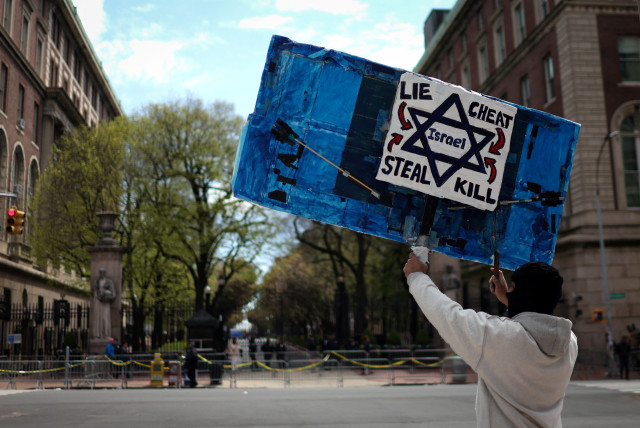Jewish student files class action lawsuit against Columbia for failing to guarantee safety

The Plaintiff, unnamed for safety reasons, is an openly Jewish student who claims to have experienced numerous instances of harassment and intimidation on campus since October 7.
A class action lawsuit against Columbia University was was filed in federal court on Monday morning on behalf of a second-year Jewish student who alleges the school could not guarantee the safety of its Jewish students.“We support peaceful protests but when a sliver of them invites and engages in violence including saying all ‘Zionists’ (read ‘Jews’) should be killed and calls for terrorists attacks on American soil, that has no place in our country,” Jay Edelson, the attorney representing the students, said in a post on X.According to Edelson, the lawsuit alleges Columbia needs to enforce its policies and let students feel free to study, take finals and otherwise be students “without worrying they will be assaulted.
Our class action is on file. We are representing Columbia University students who have been displaced from campus because the school could not guarantee their safety. We support peaceful protests but when a sliver of them invites and engages in violence including saying all…
— Jay Edelson (@jayedelson) April 29, 2024
"We are proceeding on a breach of contract theory and are seeking immediate injunctive relief," Edelson wrote on X.
The lawsuit says many individuals at Columbia are exercising their constitutionally protected right to protest and express their views about Israel, but there’s a subset of protesters who have gone beyond engaging in free speech and have “menacing goals” including committing acts of violence and intimidating and harassing Jewish students and faculty members.
The lawsuit accuses the Gaza Solidarity Encampment of being the center of “round-the-clock” harassment of Jewish students who have been punched, shoved, spat upon, and blocked from attending classes and moving freely about campus.“These extreme demonstrators are not engaging in constitutionally protected free speech. Instead, they are openly inciting violence against Jewish students,” according to the lawsuit.The lawsuit alleges Columbia has done nothing to “curb this outrageous behavior or meaningfully discipline those responsible.”According to the lawsuit, the “administration’s inaction and willingness to capitulate to the demands of this extremist element of demonstrators have fanned the flames of antisemitism across campus.”The lawsuit outlines instances in which Jewish students were directly targeted around the encampments, such as a student wearing a Star of David necklace being forced out of the encampment’s vicinity.Such instances make clear the protesters are targeting students for being Jewish, the lawsuit says.The lawsuit accuses Columbia President Minouche Shafik for prioritizing negotiations with students in the encampment over Jewish students who have been displaced.“Columbia has in no uncertain terms announced that the university is not safe for its Jewish students,” the lawsuit says.After the encampment was set up, Shafik instituted a “hybrid” model for education for the remainder of the academic year for students to attend class virtually if they didn’t feel safe enough to do so in person.“This absurd shift makes no attempt to solve the safety problem on campus, and at the same time, creates two very different educational experiences for Jewish and non-Jewish students,” according to the lawsuit.The lawsuit says Jewish students get a second-class education where they are restricted to their homes to attend class virtually, and the segregation of Jewish students is a “dangerous development” that can escalate into more severe acts of violence.The lawsuit says Columbia’s decision to shift to an online learning model constitutes a material breach of its contractual obligations.
Life on campus after October 7
The plaintiff, unidentified for safety reasons, is an openly Jewish student who has experienced numerous instances of harassment and intimidation on campus since October 7, according to the lawsuit, though she was generally able to attend classes on campus without issue.However, the lawsuit says that changed after the encampment was erected on April 18 when the level of hostility on campus escalated dramatically, making the plaintiff fearful of harassment and physical harm.“Had plaintiff known that Columbia would not provide an in-person educational environment free of harassment, plaintiff would not have chosen to enroll at or pay tuition to Columbia,” according to the lawsuit.
Jerusalem Post Store
`; document.getElementById("linkPremium").innerHTML = cont; var divWithLink = document.getElementById("premium-link"); if (divWithLink !== null && divWithLink !== 'undefined') { divWithLink.style.border = "solid 1px #cb0f3e"; divWithLink.style.textAlign = "center"; divWithLink.style.marginBottom = "15px"; divWithLink.style.marginTop = "15px"; divWithLink.style.width = "100%"; divWithLink.style.backgroundColor = "#122952"; divWithLink.style.color = "#ffffff"; divWithLink.style.lineHeight = "1.5"; } } (function (v, i) { });

